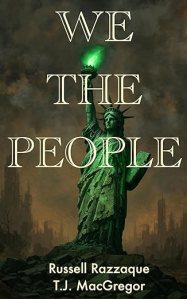Synopsis:
What if AI could show us the future—and what if that future was our extinction?
We the People: A Premonition is an AMAZON BESTSELLER and a gripping political thriller that explores the terrifying convergence of autocracy and climate collapse. Set in a not-so-distant America ruled by a fascist regime, the novel follows three unlikely heroes brought together by one truth: if they don’t act, the future is lost.
Luna Ochoa, a former FBI analyst turned underground investigator works for Leo Montoya, a reclusive millionaire funding a network tracking the government’s abuses. When the advance AI they created suddenly starts making predictions of humanity’s collapse—nuclear war, ecological annihilation, and widespread oppression—the danger becomes existential.
Enter Jake Kessler, a Pulitzer-winning journalist silenced for exposing political corruption. After crossing paths with Luna, he becomes entangled in a movement bigger than any of them imagined. Together they enter a race against time—not just to survive, but to reclaim the future.
The novel asks the question at the heart of today’s global crisis: Can we still choose a different path? Drawing on the ancient Athenian model and powered by modern technology, their vision is to build a new system where people participate in governance directly—every voice heard, every idea tested. It’s dangerous. Revolutionary. And it may be our last chance to avoid extinction.
With cinematic pacing, unforgettable characters, and razor-sharp political insight, We the People is not just a warning—it’s a call to action. It reminds us that democracy is not a guarantee. It’s a choice. And the most important character in this story is us
Favorite Lines:
“Not if our democracy deepens its roots. Not if we share power, instead of leaving the levers in the hands of a tiny cabal. If we become a real democracy, where ordinary people from every walk of life are involved, then a whole new predictive trajectory opens up.”
“You see, every crisis is also an opportunity. I created this space, not just to protect us, but to protect future generations.”
“Decisions are about judgements. We want individual people, from all backgrounds, to exercise their judgement and produce answers, through this iterative process.”
“Diversity is key. We need broad representation from the rainbow of humanity, so we can benefit from everyone’s lived experiences. That is where the creativity and innovation will come from – people from all walks of life regardless of backgrounds, ethnicity, and religious beliefs.”
My Opinion:
I received a copy of this book from the authors in exchange for my honest opinion.
We the People: A Premonition follows Luna Ochoa, her brother Juan, and journalist Jake Kessler as they uncover AI-generated predictions of a near future defined by authoritarianism, violence, and ecological collapse. Working with Leo Montoya’s secretive organization, they confront the dangers of a government bent on silencing dissent while struggling to protect their families and preserve the last fragments of democracy.
What immediately stood out to me about We the People is how uncomfortably close its fictional world feels to our current reality. This is speculative fiction that doesn’t hide behind far-flung futures or alien landscapes—it sets its stage in recognizable cities, among ordinary people, and asks us to face what could happen if democracy erodes unchecked. The opening chapters, where Luna and Juan uncover horrifying AI-predicted images of global collapse, feel almost too vivid. The terror isn’t just in the events themselves—mass protests crushed, cities drowned, governments corrupted—but in how plausible they all seem.
I found the book compelling in the way it braids thriller pacing with political commentary. The narrative never slows down—characters stumble from discovery to danger, always pursued by unseen forces loyal to an authoritarian regime—but beneath the action, Razzaque and MacGregor are making a sharp critique of our fragile democratic structures. It reminded me of dystopian classics, but the authors’ choice to anchor it in the immediacy of Orlando and other familiar settings made it hit harder.
The characters themselves—Luna, her brother Juan, journalist Jake Kessler, and their enigmatic employer Leo—give the book its heart. They’re not superheroes. They’re regular people, bruised by loss and compromise, who stumble into carrying truths bigger than themselves. I appreciated how their fear, exhaustion, and even their doubts are depicted. It makes their small acts of resistance feel braver, because they’re not framed as destined saviors, just as people making choices in impossible circumstances.
That said, the novel can feel heavy-handed at times. The imagery of catastrophe is relentless, and the villains—the billionaires and political loyalists—are painted in very stark colors. But I think that bluntness is deliberate. This isn’t a book trying to be subtle; it’s trying to sound an alarm. By the end, I wasn’t left with a neat resolution but with an uneasy sense of responsibility. The authors’ message is clear: the future isn’t written, and what happens next depends on “we the people.”
Summary:
Overall, We the People: A Premonition mixes political thriller urgency with speculative what-ifs. The novel becomes both a story of survival and a warning—reminding readers that the fate of society rests on ordinary people’s willingness to resist and reimagine the future.
For readers who enjoy fiction that feels both urgent and socially conscious, this book sits at the intersection of political thriller, dystopian speculative fiction, and social commentary. Happy reading!
Check out We the People: A Premonition here!
